- Administrator
- Albums and Singles
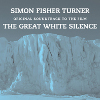
This massive double-album was pretty much a dream commission for Simon Fisher Turner: being asked by the British Film Institute to score the restored footage from Robert Falcon Scott's doomed 1910 expedition to the South Pole.  Given the demands and difficulties involved (soundtracking endless silent footage of cavorting penguins, for example), I'd say Simon's efforts were hugely successful in regards to verisimilitude, ingenuity, subtlety, and creating an appropriately haunted and desolate mood.  When taken as a stand-alone album with no visual context, however, the long lulls between flashes of beauty and interludes of bittersweet whimsy can be a bit wearying.
To state that Simon Fisher Turner has had an interesting career trajectory would be a bit of an understatement, as he has been a child actor, a teen pop artist, a member of The The, and one of the two comic geniuses behind the enigmatic Deux Filles.  He is most well-known, however, for his work as a soundtrack composer, having scored Loaded as well as some some films involving music-savvy folks like Derek Jarman and David Lynch.  Scoring The Great White Silence would have been daunting for anyone though.  Even the BFI's restoration of the film was nightmarishly complicated, as it had to be painstakingly pieced together from Herbert Ponting's negatives and his notes rather than an existing print.  That turned out to be ominous foreshadowing for Turner's own Herculean challenge (he actually described the experience as "terrifying"): composing a compelling score for two hours of black and white silent footage of ice, penguins, and men that were about to die slowly and miserably.  The task was further complicated by the fact that the film is a fairly high-profile and historically important work and that the music had to add drama and mood to Ponting's material without ever overpowering it.
The BFI's Jane Giles summarized Turner's quandary perfectly as "the score is really important to how to sell a two-hour non-fiction film where there's a lot of penguins and a lot of ice and not much drama."  Ponting's footage wasn't intended as a feature film documenting the end of one of England's greatest explorers– it was commissioned for a series of newsreels to sate the public's thirst for constant updates regarding the expedition and for adorable footage of penguins, which no one in England had seen before.  He didn't even attempt to weave it into a film until ten years later.  Consequently, it has some shortcomings regarding its narrative arc.  Naturally, the ultimate outcome of the voyage retroactively adds gravity, but Turner still had to make it all seem appropriately gripping without transforming Scott's final days into a music video for a Simon Fisher Turner ambient piece.
Rather than launching right into constructing the composition, Turner instead devoted quite a bit of effort to searching out sounds that had strong connections to the footage.  Appropriately, there is quite a bit of silence here, but it is meaningful silence.  Chris Watson had actually made some recordings in the hut where Captain Scott died (for an unrelated project) and helpfully offered them to Turner.  More overtly, Simon also employed what he calls "fake Foley effects" to match the actions taking place on the screen, like faking wind noises by dragging a microphone along a satin curtain.  Additionally, he had excellent luck acquiring quite a few other thematically appropriate sounds, recording the still-intact bell from Scott's ship, locating some contemporaneous gramophone recordings, and sleuthing out the hymn used to close Scott's memorial service.  Once all these elements fell into place, Simon's anxiety subsided a bit and everything started to cohere into a workable shape and trajectory.
The core of the soundtrack is built upon very slow-moving and minimal ambient drone that generally stays fairly austere and melancholy in tone.  Some of it is a bit bland, but I like most of it–in fact, some of it is incredibly beautiful.  The synthesizer parts rarely get the chance to stick around long enough to fully engulf me though, presumably because penguins, precocious cats, and dancing seamen keep appearing on the screen to necessitate a mood shift.  Fortunately, the resultant interludes are exactly what makes this piece so unique and fascinating.  In fact, the scratchy gramophone recordings of a female classical vocalist and the nakedly unprocessed closing hymn are among the most poignant and stunning moments of the entire album.  Though the "found" snippets of music tend to frequently steal the show, they wouldn't work if Turner hadn't done such an amazing job flowing seamlessly between relatively disparate moods (from "banjo hoedown" to "otherworldly, pitch-shifting ambiance," for example).  For all its digressions, the piece never loses the feel of an unfolding whole.  Simon also does an excellent job breaking up his sprawling opus with intelligent textural juxtapositions, cutting through his electronic reverie with sharp strings, scratchy old 78s, swooping theremins, and well-placed field recordings.
As a soundtrack, The Great White Silence probably exceeded everyone's highest expectations, as it manages to be sublime and deeply emotionally resonant without ever becoming too forceful.  In fact, it may very well be a masterpiece, though I won't know for certain until the film gets a US release.  As a decontextualized album, it is a bit flawed solely because it has been removed from its intended purpose as part of a larger whole.  There are a number of passages that I absolutely love, but they slowly trickle out over a period of nearly two hours, which makes this a tough album to listen to in its entirety.  This would be a lot easier to fully embrace if I could isolate individual stretches, but am sure chopping the soundtrack into smaller pieces would have wrecked the flow and synchronicity.  Turner had to choose between making a great Simon Fisher Turner album and making great soundtrack and he chose the latter, but he certainly came admirably close to nailing both.
Samples:
 
 
Read More
- Administrator
- Albums and Singles
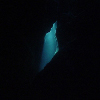
This is Alec Koone's full-length debut and it is a feverishly anticipated one in many circles, as his 2010 EP (See Birds) boasted some pretty spectacular moments.  Wander/Wonder thankfully keeps most of elements that I love about Balam Acab's languorous, spectral soul intact, but takes a large leap forward in sophistication and ambitionl– in fact, quite a few people are already hailing it as one the year's best albums.  There are a couple of things that keep me from making that claim myself, but there is no denying that Koone is a goddamn wizard at what he does.
See Birds was the first physical release on Tri-Angle, the label run by 20 Jazz Funk Greats' Robin Carolan, marking the beginning of a very distinctive and wildly successful aesthetic: sexy and damaged-sounding slow-motion soul.  In fact, one of Koone's songs even wound up in a L'Oreal commercial starring Beyoncé– a truly surreal and improbable feat for a teenager on an underground label.
In a broad sense, Koone's work shares quite a bit of common ground with his labelmates oOoOO and Holy Other, as his songs are crafted from chopped-up and pitch-shifted vocal hooks and simple, languid beats.  Balam Acab has a much more boldly experimental streak than the rest of the Tri-Angle roster though.  For example, despite all of See Bird's sultry beats and beautifully fragile hooks, Koone never let a song go by without something warped or ingeniously anachronistic threatening to drag it all forcibly into far weirder, more abstract territory.  Such tactics would have been jarring and self-defeating in lesser hands, but Koone somehow always knew exactly how far he could push things without losing control.  In many ways, Wander/Wonder takes these skewed tendencies much further.  Unfortunately, Balam Acab lost some of its sharper textural edges in the process.
To put it bluntly: Koone is a bit water-obsessed.  Most of these eight songs feature very prominent burbling, gurgling, and dripping water sounds and absolutely everything sounds either submerged or amniotic (so much so that The Wire wryly described Koone's new direction as "womb-hop").  For example, the dripping and rippling sounds in "Fragile Hope" are so loud that they grab as much focus as the actual music.  This curious artistic decision is a mixed success, as it makes the entire album feel like a coherent, thematically linked suite and adds greatly to the dreamlike, post-coital feel of the music, but it is also a bit over-the-top and hackneyed.  Another curious quirk here is that Alec loves to pitch-shift vocals upwards to make them sound angelic or childlike (most of his peers go the other direction, opting to slow down and stretch vocals eerily).  I will grudgingly concede that the "sexy chipmunk" vocals succeed in making the songs feel endearingly innocent and vulnerable, but Koone comes uncomfortable close to sounding precious on several occasions.
In theory, this is exactly the sort of album that I would normally loathe: it relies very heavily on a hugely overused motif (water), lacks the grittier and more exotic touches of its predecessor, has some beats that fix it very much at this specific point in time, and is very intent on sounding "pretty."  Yet despite all those damning characteristics, I still find Wander/Wander extremely absorbing and likeable– Koone is simply that absurdly good at what he does. For all its comparative toothlessness, it is absolutely teeming with haunting vocal hooks and multiple layers of textured and hallucinatory strangeness in the periphery.  I was also struck by the sheer nakedness and simplicity of the melodies, as some pieces are little more than a single ghostly, melancholy voice amidst some hissing, crackling, and rippling, but they nevertheless manage to hold my attention completely.  It is not a stunning epiphany to say that strong motifs can stand on their own and don't need any added density to prop them up, but it is extremely rare for a "pop" album to be this daringly spare.
Finally, Alec is pretty ballsy in both avoiding the successful formula that put him on the map and in circumventing normal song structure.  He has essentially gone from writing nothing but potential singles to writing almost no potential singles at all.  There are a few grooves and beats here and there, but the bulk of the album drifts along with a dream-like logic, its melodies seamlessly emerging from or sinking into gently burbling pools of field recorded ambiance.  If Koone ever gets any softer than this, I am definitely out, but for now I am very much an admirer.  There are certainly some dubious individual moments strewn throughout this album, but they are all ultimately in service of a beguilingly warm and inspired whole.
Samples:
 
 
Read More
- Administrator
- Albums and Singles

Jefre Cantu-Ledesma's Love Is A Stream was one of my favorite albums from last year, but somehow the fact that his Tarentel bandmate released a great solo album of his own slipped completely under my radar.  Curiously, the two albums could not be more different, as Grady almost completely eschews any hints of the languid post-rock experimentalism of his main gig in favor of more traditional acoustic fare informed by both West African kora music and Eastern-tinged acoustic guitar titans from the '70s folk scene.  Some of it sounds a bit too familiar to make much of an impact on me, but the album's high points are impressive enough to easily eclipse such moments.
Instrumental acoustic guitar albums have always been very difficult for me to connect with on any kind of deep level.  I can certainly appreciate their composition and complexity, but it is pretty rare for me to truly love an acoustic guitar piece.  Grody, to his credit, has managed to bridge the vast gulf between aesthetic appreciation and emotional resonance in at least one case here, "Four Years."  There is no mystery or radical twist to the song, just a great melancholy chord progression combined with a simple, clear, and lushly melodic motif.  Grody simply gets everything exactly right: the harmonies, the pacing, the string scrapes, the texture, etc.  It is an absolutely perfect piece, but it is not an anomaly.  In fact, the languid and beautifully unhurried "Well Wisher" comes close to reaching similar heights, but ends far too soon to accumulate the necessary depth and momentum.  The spare and intimate "Hunted/Haunted" also comes quite close to replicating the magic, unfolding a beautiful progression of minor key arpeggios over a bed of tape hiss.  Curiously, that is the only piece that openly betrays the home-recorded origin of this album.  Too bad– I love tape hiss in this context.
As gifted as Grody is as a steel guitarist, most of Fountain's greatest moments come when he expands his palette a bit to allow room for organs, feedback, and studio-tweaking.  The title piece, for example, benefits greatly from its warm electronic haze and sublime organ accompaniment.  The gentle organ and plucked harmonic reverie "Night Blooms" is also quite beautiful, as is the glistening ambiance of "Covered Mirrors," the one instance where Danny seems to set his acoustic guitar aside entirely.  The album's mesmerizing closer ("Finding Time") again treads quite similar territory, but with stuttering and gently cascading harmonics obscured by its murky, shimmering drones.  For the most part, I think I prefer the more ambient/soundscape side of Danny's work ("Four Years" being an exception) , but the balance between drone works and guitar pieces works quite well here.  The variety suits the album beautiful.
I am actually a bit surprised by how much I like this album, as at least half of these songs are excellent.  In general, I am more drawn to work with a very distinctive or unique aesthetic than Grody exhibits here (though it is also nice when someone is just extremely good at what they do).  I don't mean to imply that Danny is derivative or lacking his own niche, but the more exotic and experimental aspects of his work (while present) are quite secondary to Fountain's success.  Sure, it is pretty neat that Danny artfully uses harmonics to mimic the chiming timbre of African harp music, but it is far more remarkable how intuitively skilled he is at crafting strong melodies and immersive soundscapes and how he avoids ruining his great ideas with clutter or overproduction.  He is simply very gifted at all of the traditional stuff that truly matters: intelligent arranging, compelling dynamics, great use of space, maintaining an unwaveringly "human" feel, etc. As a result, he has created a very warm, intimate, and organic album that has completely won me over.
Samples:
 
Read More
- Administrator
- Albums and Singles
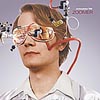 Dude, I had no idea how BECK Dirk Dresselhaus had become. To be fair, the only Schneider TM that I was really familiar with at all before Zoomer was 'Binokular' from two years ago, which I really liked. But there were only 2 tracks with vocals on that album/EP, and they were fairly understated; on Zoomer, the vocals are pretty upfront most of the time.
Dude, I had no idea how BECK Dirk Dresselhaus had become. To be fair, the only Schneider TM that I was really familiar with at all before Zoomer was 'Binokular' from two years ago, which I really liked. But there were only 2 tracks with vocals on that album/EP, and they were fairly understated; on Zoomer, the vocals are pretty upfront most of the time.
And he really does sound like Beck (or at least a glossier, techno-savvy, Germanic Beck doppleganger), especially on pop-friendly tracks like "Frogtoise" and "Abyss." I could forgive Dresselhaus for his Beckishness if his lyrics were decent, but to quote verbatim from the lyric sheet: "I had a dream / I cut a frog in half / And a turtle too / oh, oh, oh, oh..." (It's the "ohs" and "yeahs" and "heys" that really get to me.) Some of the singing actually sounds pretty good, if a bit overly chipper. Musically, most of the album is upbeat, light electronic pop, with a little guitar thrown in for good measure. The production is slick and the beats are rhythmically interesting. But Dresselhaus doesn't take many risks, preferring to stay within safe, accessible territory—and unfortunately, it makes 'Zoomer' seem a little dated. There's obviously a lot of talent here, but its overshadowed by Schneider TM's seemingly newfound pop flashiness (see the Beckish cover shot). I guess part of me really wanted this album to be a good counter-attack to the (sigh) "electroclash" mentality of most recent electronic pop. [Note: you can be influenced by New Order without trying to sound exactly like them.] To be fair, the influences run deep on Zoomer, but the end result doesn't stick with me like I hoped it might. The one exception is the album's opener, "Reality Check," which, despite its overused vocoded vocals and flangy guitar, is a fine, catchy pop song that I can't help returning to. Considering that the album also contains the awful "Turn On," with (I'm serious) a guest rapper, the two tracks balance out, returning 'Zoomer' to its natural state of mediocrity.
 
samples:
 
Read More
- Administrator
- Albums and Singles
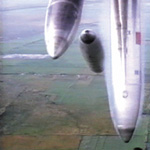 Fans and critics have uncontrollable tendencies to place far too many expectations on something they had no expectations of to begin with. Think back to the first time you heard this Canadian collective: there was something about that very moment which COMMANDED your attention whether you care to admit it or not, even if you like the band or not. The sound was fresh and warmly welcomed, grand and overwhelming at times. Transcending a number of genres, there was little room for comparisons or classifications. They achieved something which my friend, Jeremy, of Temporary Residence considers a mark of success: people started comparing -other- things to them. There was something more, however—something almost indescribable and intangible—which started out like a small mystery and has built to a frenzied, inescapable force-field which surrounds this simple instrumental rock group. Godspeed certainly could share the blame of setting the winds in motion—perhaps due to the choices of samples and the use of symbols and messages tucked inside artwork or projected on the stage screens. Couple these with a feverish, caustic and sensational media, aching for a soundbyte to exploit or an individual to single out, and things can easily spin out of control.
Fans and critics have uncontrollable tendencies to place far too many expectations on something they had no expectations of to begin with. Think back to the first time you heard this Canadian collective: there was something about that very moment which COMMANDED your attention whether you care to admit it or not, even if you like the band or not. The sound was fresh and warmly welcomed, grand and overwhelming at times. Transcending a number of genres, there was little room for comparisons or classifications. They achieved something which my friend, Jeremy, of Temporary Residence considers a mark of success: people started comparing -other- things to them. There was something more, however—something almost indescribable and intangible—which started out like a small mystery and has built to a frenzied, inescapable force-field which surrounds this simple instrumental rock group. Godspeed certainly could share the blame of setting the winds in motion—perhaps due to the choices of samples and the use of symbols and messages tucked inside artwork or projected on the stage screens. Couple these with a feverish, caustic and sensational media, aching for a soundbyte to exploit or an individual to single out, and things can easily spin out of control.
The band's fourth recording feels like their attempt to wrestle control back into their court. 'Yanqui' is a simple and pleasing instrumental rock record, as straight up as Godspeed can probably ever get—void of the musical gimmicks in which the band has become known for. The songs are once again lengthy, but noticably absent of the multiple-parts approach. The build up on each of the five tracks is simple but no less enjoyable than anything else they've done, whether it's with the droning strings on the second part of "09-15-00" or the quiet yet piercing bell-like opening of the first part of "Motherfucker=Redeemer." In addition, there are no speeches of the moral decline by senile old people or random Iron Maiden fans roaming the streets. Either they didn't want to go "mining for shit" through various tapes of field recordings or they're sick of people actually believing these bits are far more than instrumental coloration. The only extra-curricular additions are some pleasantly odd chords struck by wind instruments during the quiet moments of "Rockets Fall on Rocket Falls." For an album which is not meant to be their crossover or major breakthrough, I think the band has successfully conveyed, musicially, that they are simply a rock band, and don't want to be either saviors nor Satan's spawn.
 
samples:
 
Read More
- Administrator
- Albums and Singles
 As the art punk progression tends more and more towards electronic experimentation, Black Dice are ready to offer their interpretation of the movement, fusing their improvisational noise rock with an electronic sound which calls to mind Beaver and Krause, and a musique concrete similar to Xenakis. There are clicks, beeps, voice samples, chirps, echoes, robots, chimes, wails, mystic hums, crunches, and Oriental pentatonic scales. The group's previous releases for the Gravity and Troubleman Unlimited labels were unbalanced by their composition: many extremely short, kinetic songs combined with one or two longer songs. Here, the songs start off long and get increasingly longer. The band chooses to employ its heretofore unexplored potential energy in these songs, rather than just brashly offering their kinetic formulae. It's fascinating to hear this evolution, particularly because I used to think Black Dice were one-trick ponies. Live shows of the band were always intense and fun, but not always well-suited for translation onto record. With this record they have proved me wrong, and have developed into a forceful and imaginative experimental collective to listen to in my room. What will be interesting to see is whether their new sound is adaptable to their explosive live performances. 'Beaches and Canyons' starts out with the six-minute long "Seabird," an appropriately maritime number which unmistakably features some perturbed plover signaling the unjust encroachment on its nesting sand dune with constant squawks. The plover may or may not be robotic, and may or may not actually be a tern. By the end of the song, the intruder has clearly left, but bird is still squawking, albeit a little less virulently. "The Dream is Going Down" takes us to a canyon where robot voices bounce of the eroding limestone walls, while during the last six minutes of "Endless Happiness," waves and tidal sounds wash over us as the supposedly interminable bliss eventually does fall off. By the time the seventeen minutes of "Big Drop," the last song, comes about, we have literally dropped from the canyons in an errant spelunking mission into a cave where sound bounces about violently and the vocals scream, recalling Black Dice's older output. Wherever we find ourselves by the end of the album, the echoes in the music remind us that we are still in Black Dice's canyons, while the crashing of waves reminds us that we still have one foot rooted on the shores of an undiscovered beach.
As the art punk progression tends more and more towards electronic experimentation, Black Dice are ready to offer their interpretation of the movement, fusing their improvisational noise rock with an electronic sound which calls to mind Beaver and Krause, and a musique concrete similar to Xenakis. There are clicks, beeps, voice samples, chirps, echoes, robots, chimes, wails, mystic hums, crunches, and Oriental pentatonic scales. The group's previous releases for the Gravity and Troubleman Unlimited labels were unbalanced by their composition: many extremely short, kinetic songs combined with one or two longer songs. Here, the songs start off long and get increasingly longer. The band chooses to employ its heretofore unexplored potential energy in these songs, rather than just brashly offering their kinetic formulae. It's fascinating to hear this evolution, particularly because I used to think Black Dice were one-trick ponies. Live shows of the band were always intense and fun, but not always well-suited for translation onto record. With this record they have proved me wrong, and have developed into a forceful and imaginative experimental collective to listen to in my room. What will be interesting to see is whether their new sound is adaptable to their explosive live performances. 'Beaches and Canyons' starts out with the six-minute long "Seabird," an appropriately maritime number which unmistakably features some perturbed plover signaling the unjust encroachment on its nesting sand dune with constant squawks. The plover may or may not be robotic, and may or may not actually be a tern. By the end of the song, the intruder has clearly left, but bird is still squawking, albeit a little less virulently. "The Dream is Going Down" takes us to a canyon where robot voices bounce of the eroding limestone walls, while during the last six minutes of "Endless Happiness," waves and tidal sounds wash over us as the supposedly interminable bliss eventually does fall off. By the time the seventeen minutes of "Big Drop," the last song, comes about, we have literally dropped from the canyons in an errant spelunking mission into a cave where sound bounces about violently and the vocals scream, recalling Black Dice's older output. Wherever we find ourselves by the end of the album, the echoes in the music remind us that we are still in Black Dice's canyons, while the crashing of waves reminds us that we still have one foot rooted on the shores of an undiscovered beach.
samples:
Read More
- Administrator
- Albums and Singles
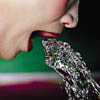 The downfall of any musical trend begins at the point where the music becomes too easy to make. From there, hoards of immitators flood the market and are scooped up by any record label wanting to compete in the "new market" just like a lipstick company has to have the coolest color of the year to compete with their competitor or the trend-setting upstart who got a major break. I Am Spoonbender have not only remained relatively quiet through the electroclash explosion, but refuse to allow keyboard presets, generic production and predictable riffs drive their music. While this hasn't made them as popular as the biggest offenders of dullness like Felix da Housecat, releases like this, along with their previous EP, 'Teletwin,' will still be as listenable years from now and just as tasty as they are today. 'Shown Actual Size' is only three short songs totalling less than 14 minutes, the first thing they have released in two years, and serves as a teaser for the forthcoming DVD/album, 'Hidden Persuaders'. It opens with the forceful "I Went and Had My Knives Sharpened," where a ripping, sassy, distorted bass (thanks to Dave Edwardson of Neurosis) undercuts nasty, angular synths and strong vocals from the female and male singers. "Remover-Installer" relentlessly continues with the same energy while the closer, "Re-dial Meant 'Remember'" recalls to a darker side of 1980s synth music, left in the past thanks to the absence of radio hits and perky videos.
The downfall of any musical trend begins at the point where the music becomes too easy to make. From there, hoards of immitators flood the market and are scooped up by any record label wanting to compete in the "new market" just like a lipstick company has to have the coolest color of the year to compete with their competitor or the trend-setting upstart who got a major break. I Am Spoonbender have not only remained relatively quiet through the electroclash explosion, but refuse to allow keyboard presets, generic production and predictable riffs drive their music. While this hasn't made them as popular as the biggest offenders of dullness like Felix da Housecat, releases like this, along with their previous EP, 'Teletwin,' will still be as listenable years from now and just as tasty as they are today. 'Shown Actual Size' is only three short songs totalling less than 14 minutes, the first thing they have released in two years, and serves as a teaser for the forthcoming DVD/album, 'Hidden Persuaders'. It opens with the forceful "I Went and Had My Knives Sharpened," where a ripping, sassy, distorted bass (thanks to Dave Edwardson of Neurosis) undercuts nasty, angular synths and strong vocals from the female and male singers. "Remover-Installer" relentlessly continues with the same energy while the closer, "Re-dial Meant 'Remember'" recalls to a darker side of 1980s synth music, left in the past thanks to the absence of radio hits and perky videos.
samples:
Read More
- Administrator
- Albums and Singles
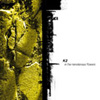 K2, the prolific artist who arrived in the third wave of Japanese noise musicians and is currently one of the last ones standing (MSBR and Government Alpha are still relevant, Merzbow and Aube have descended into pathetic self-parody... and don't get me started on Keiji Haino, yeesh), has changed course. Rather than the metal-on-metal screech for which he has previously been known, K2's newest album is all fast-cut collage of drum machines, pop music, noises both harsh and not, and more flavors than I can now recount. A sound begins, then abruptly interrupts itself, occasionally doubling back only to fall apart and maybe be picked up by some incongrous thing. All sounds remain in place long enough to be plowed under by the next one, and K2 keeps the pace relentless for the full hour of the disc. And what a good time this album is! The absurd juxtapositions remind me of the Hafler Trio's 'A Thirsty Fish,' but with no pretense of sublimity. In fact, the sublime appears to be far from K2's range, he having opted instead for instant gratification, even if that means bringing in elements that shouldn't work (but, miraculously, they do). Some delay settings are painfully silly and banal, as are some 70s-era drum machine sounds and Western choral records, but these only enrich the sense of wide-eyed joy that the music evokes. So do the flourishes of human gesture; the clearly manual adjustment of a volume level, or the telltale clip of a computer splice, or the wildly variant fluctuations in dynamics and sound-quality all remind the listener that there is somebody driving, and that person has a clue where the music will lead. It's a damn fun ride.
K2, the prolific artist who arrived in the third wave of Japanese noise musicians and is currently one of the last ones standing (MSBR and Government Alpha are still relevant, Merzbow and Aube have descended into pathetic self-parody... and don't get me started on Keiji Haino, yeesh), has changed course. Rather than the metal-on-metal screech for which he has previously been known, K2's newest album is all fast-cut collage of drum machines, pop music, noises both harsh and not, and more flavors than I can now recount. A sound begins, then abruptly interrupts itself, occasionally doubling back only to fall apart and maybe be picked up by some incongrous thing. All sounds remain in place long enough to be plowed under by the next one, and K2 keeps the pace relentless for the full hour of the disc. And what a good time this album is! The absurd juxtapositions remind me of the Hafler Trio's 'A Thirsty Fish,' but with no pretense of sublimity. In fact, the sublime appears to be far from K2's range, he having opted instead for instant gratification, even if that means bringing in elements that shouldn't work (but, miraculously, they do). Some delay settings are painfully silly and banal, as are some 70s-era drum machine sounds and Western choral records, but these only enrich the sense of wide-eyed joy that the music evokes. So do the flourishes of human gesture; the clearly manual adjustment of a volume level, or the telltale clip of a computer splice, or the wildly variant fluctuations in dynamics and sound-quality all remind the listener that there is somebody driving, and that person has a clue where the music will lead. It's a damn fun ride.
Read More
- Administrator
- Albums and Singles
 This cornucopia of Hip-Hop-styled and inspired music makes for a perfect primer for the new directions in which this music is thriving, from an independent, non-bling-bling standpoint. The Chicago-based Chocolate Industries label has put together a choice compilation featuring a plethora of artists which include members of the Def Jux familia such as Aesop Rock and Mr. Lif, Prefuse 73, Diverse, Cibo Matto's Miho Hatori and DJ Food. Opening the disc is a college radio sounding ad listing the guest appearances which launches into Prefuse 73's "Radio Attack Pt.2" which has some cool breaks that vary from the version on his 'Vocal Studies + Uprock Narratives' release. Souls of Mischief's "Spark" provides a head-nodding groove filled with some simple yet great organ samples while proclaiming, "We align with the planets and stars / Advancing the art form whenever we spar." RJD2's "True Confessions" chronicles the satirical church confessions of a seventeen year old stereo thief and burglar to a shocked and surprised priest, set to a rocking backing track of pounding drums and distorted guitar samples. El-P's signature backing track and sharp lyrics ring out in "Deadlight" with vocal plays on Apple's FireWire and Apocalypse Now, complete with a reference to 70s fusion heads Emerson Lake and Palmer and Pavlov. This is one of the more thought provoking tracks on the disc that'll have ya hitting the back skip button to make sure you caught it all. In the "surprise surprise" department—but then again, not really—is Tortoise with their contribution "C.T.A.," which has a real remix feel to it. Comprised of clipped live drums, synth patches and processed guitar, the track builds with repetition throughout the clever, winding progression. At about the halfway mark, the most anticipated and monstrous bassline kicks in and pulls it home. Overall, the disc's eighteen tracks play through as if you were listening to a hip college radio program, complete with brief interludes from Prefuse 73 and altered chit-chat.
This cornucopia of Hip-Hop-styled and inspired music makes for a perfect primer for the new directions in which this music is thriving, from an independent, non-bling-bling standpoint. The Chicago-based Chocolate Industries label has put together a choice compilation featuring a plethora of artists which include members of the Def Jux familia such as Aesop Rock and Mr. Lif, Prefuse 73, Diverse, Cibo Matto's Miho Hatori and DJ Food. Opening the disc is a college radio sounding ad listing the guest appearances which launches into Prefuse 73's "Radio Attack Pt.2" which has some cool breaks that vary from the version on his 'Vocal Studies + Uprock Narratives' release. Souls of Mischief's "Spark" provides a head-nodding groove filled with some simple yet great organ samples while proclaiming, "We align with the planets and stars / Advancing the art form whenever we spar." RJD2's "True Confessions" chronicles the satirical church confessions of a seventeen year old stereo thief and burglar to a shocked and surprised priest, set to a rocking backing track of pounding drums and distorted guitar samples. El-P's signature backing track and sharp lyrics ring out in "Deadlight" with vocal plays on Apple's FireWire and Apocalypse Now, complete with a reference to 70s fusion heads Emerson Lake and Palmer and Pavlov. This is one of the more thought provoking tracks on the disc that'll have ya hitting the back skip button to make sure you caught it all. In the "surprise surprise" department—but then again, not really—is Tortoise with their contribution "C.T.A.," which has a real remix feel to it. Comprised of clipped live drums, synth patches and processed guitar, the track builds with repetition throughout the clever, winding progression. At about the halfway mark, the most anticipated and monstrous bassline kicks in and pulls it home. Overall, the disc's eighteen tracks play through as if you were listening to a hip college radio program, complete with brief interludes from Prefuse 73 and altered chit-chat.
samples:
- Diverse - Time
- Caural - Our Solstice Walk
- While - Haze-3
Read More
- Diane Wei Lewis
- Albums and Singles
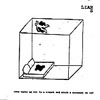 Not so conceptual, not sad or very beautiful, not likely to persist in its impression, Liars simply grab onto immediate, relentless hooks and make urgent, funky fun. It's like this: three-minute songs with slithery disco-punk bass lines, given a slightly chilly imperviousness by sparse synthesizers and walkie-talkie barked vocals. Good stuff, with the exception of the last track, which ends in a looped locked-groove, extending over 30 minutes! (An excuse to make an "album" out of an EP?) Go figure, because this plodding bore is the complete opposite of the album's leading tracks.
Not so conceptual, not sad or very beautiful, not likely to persist in its impression, Liars simply grab onto immediate, relentless hooks and make urgent, funky fun. It's like this: three-minute songs with slithery disco-punk bass lines, given a slightly chilly imperviousness by sparse synthesizers and walkie-talkie barked vocals. Good stuff, with the exception of the last track, which ends in a looped locked-groove, extending over 30 minutes! (An excuse to make an "album" out of an EP?) Go figure, because this plodding bore is the complete opposite of the album's leading tracks.
 
"Grown men don't fall in the river, just like that" is a rousing, somewhat ironic wake-up call from the band that's got its "finger on the pulse of America": "Can you hear us? / Not too political, nothing too clever." I applaud the use of electronic handclaps and cowbells on "Mr your on fire Mr." On this track, you can practically see the lead singer wiggling his butt in this jerky twister's breathless pauses. It's not the most memorable album I've heard recently, but the songs are captivating in their frenetic, ephemeral sorta way. However, most of the material here is so sonically of a genre and lyrically unremarkable that I can't really think of a reason why I would choose the Liars above any other band that makes punk rawk kids shake their thangs.
samples:
 
Read More
- Administrator
- Albums and Singles
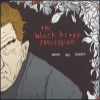 Black Heart Procession's fourth album marks a divergence away from the band's convention to number each album consecutively, so it should not surprise anyone that the sound of the band has also undergone a change. Within the first few minutes of the album, there are unprecedented female backing vocals which persist throughout the record and end up feeling like more of an indulgence than an affectation. "Amore del Tropico" is supposedly an overture to a murder mystery. Like anyone who has seen the band's live shows, which are robust with masks, disguises, and theatrical distance, I was at first skeptical about the sincerity of this project as a true murder mystery. After hearing "Tropics of Love," the first full-fledged song after a brief opening number, my skepticism disappeared. The song begins with a snazzy up-tempo beat to which you could snap your fingers, and you begin to wonder if they are scoring some lost Raymond Chandler novel, as this song could easily fit into the opening titles sequence. Interestingly, there is an 'Amore del Tropico' DVD forthcoming which will flesh out the narrative of this tropical murder mystery, with each song from the album creating a new chapter. It will be interesting to see if this project ever materializes. From what we have at hand now, I don't think I could tell you who was killed, where it occurred, or what the murder weapon was, let alone solve the crime. Perhaps my bumbling sleuthing is due to the fact that I find it hard to get drawn into this album like the previous Black Heart Procession records. I found myself distracted while listening to the album, trying to piece together the underlying mystery, but disgruntled knowing that I was never very good at solving even the most rudimentary Encyclopedia Brown case. The one time I was fully aware of the album's concept was in "Fingerprints," when singer Pall Jenkins repeats, "They found my fingerprints," amidst a wailing violin which is reminiscent of the fiddle from Bob Dylan's 'Desire' album. While adopting the mood of the murder mystery, the Black Heart Procession have forsaken their signature mood of old, which was grave, dense and swirling. Despite the macabre subject, the newly forged mood seems light and comical. "A Cry for Love" would be a song of the old Black Heart mood, were it not for the punctuating female backing vocals, which sound like they were culled from Isaac Hayes's "Theme from Shaft." The finale, "The One Who Disappeared," returns reluctantly to the older Black Heart sound, and it is comforting to know that, now that the murder mystery has dwindled down to its final clues, and all the leads and hunches have been followed to their end, the band at last can retrace its footsteps back to where they began and start again from where they left off.
Black Heart Procession's fourth album marks a divergence away from the band's convention to number each album consecutively, so it should not surprise anyone that the sound of the band has also undergone a change. Within the first few minutes of the album, there are unprecedented female backing vocals which persist throughout the record and end up feeling like more of an indulgence than an affectation. "Amore del Tropico" is supposedly an overture to a murder mystery. Like anyone who has seen the band's live shows, which are robust with masks, disguises, and theatrical distance, I was at first skeptical about the sincerity of this project as a true murder mystery. After hearing "Tropics of Love," the first full-fledged song after a brief opening number, my skepticism disappeared. The song begins with a snazzy up-tempo beat to which you could snap your fingers, and you begin to wonder if they are scoring some lost Raymond Chandler novel, as this song could easily fit into the opening titles sequence. Interestingly, there is an 'Amore del Tropico' DVD forthcoming which will flesh out the narrative of this tropical murder mystery, with each song from the album creating a new chapter. It will be interesting to see if this project ever materializes. From what we have at hand now, I don't think I could tell you who was killed, where it occurred, or what the murder weapon was, let alone solve the crime. Perhaps my bumbling sleuthing is due to the fact that I find it hard to get drawn into this album like the previous Black Heart Procession records. I found myself distracted while listening to the album, trying to piece together the underlying mystery, but disgruntled knowing that I was never very good at solving even the most rudimentary Encyclopedia Brown case. The one time I was fully aware of the album's concept was in "Fingerprints," when singer Pall Jenkins repeats, "They found my fingerprints," amidst a wailing violin which is reminiscent of the fiddle from Bob Dylan's 'Desire' album. While adopting the mood of the murder mystery, the Black Heart Procession have forsaken their signature mood of old, which was grave, dense and swirling. Despite the macabre subject, the newly forged mood seems light and comical. "A Cry for Love" would be a song of the old Black Heart mood, were it not for the punctuating female backing vocals, which sound like they were culled from Isaac Hayes's "Theme from Shaft." The finale, "The One Who Disappeared," returns reluctantly to the older Black Heart sound, and it is comforting to know that, now that the murder mystery has dwindled down to its final clues, and all the leads and hunches have been followed to their end, the band at last can retrace its footsteps back to where they began and start again from where they left off.
samples:
Read More

